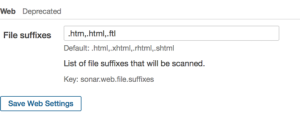I tried enabling the SCM integration from our CodeRanch Sonar install to our SVN repository. It didn’t quite work out the way I was hoping. But I learned stuff so it makes for a good blog entry.
Wait? The SCM Activity Plugin is deprecated?
If you search for Sonar SCM plugin, you get to the plugin documentation page. Which appears to be useful. Except that it says the plugin has been deprecated since Sonar 5.0. I stopped reading at that point and puzzled over it. If you continue to read, it says “This plugin is deprecated since SonarQube 5.0 which has built-in support for SCM information and which relies on independent plugins to cover SCM providers.” Ah. So it is deprecated because it is now a core feature. That explains why the functionality shows up on our Sonar.
Time to enable
I generated another SVN user and set the username/password in Sonar. I then set “disable the SCM sensor” to false and ran our Jenkins build. And I got this. Well, it went on for pages, but you get the idea:
[sonar:sonar] Sensor SCM Sensor
[sonar:sonar] SCM provider for this project is: svn
[sonar:sonar] 1404 files to be analyzed
[sonar:sonar] 0/1404 files analyzed
[sonar:sonar] Missing blame information for the following files:
[sonar:sonar] * /data/vhost1/ciengine.javaranch.com/data/jobs/JForum/workspace/src/main/java/net/jforum/util/bbcode/BBCodeHandler.java
[sonar:sonar] * /data/vhost1/ciengine.javaranch.com/data/jobs/JForum/workspace/src/main/java/net/jforum/util/concurrent/Executor.java
Ok. So the credentials are good as Sonar can connect to see how many files there are. Google and SVN plugin page both suggested the problem was not being on Subversion 1.5 or lower. I looked around and that didn’t appear to be the case. svnadmin —version returned 1.7.8 and the repository was on 1.6. So I thought maybe the mismatch was the problem and tried to run svnadmin upgrade svn (svn is the name of the folder containing our repository on disk). Then this happened and I had to recover from it.
Then it worked
After I upgraded the Subversion repository (or whatever the hell I did by accident), I was able to commit and trigger another Jenkins/Sonar build. I saw the person who committed lines of code in each file. And what’s really cool is that it WENT BACK IN TIME. I see the committers that aren’t active on CodeRanch anymore and haven’t contributed code in years. That is really cool.
What I was hoping it would do vs what it actually does
I wanted to see the “scm blame” output when reviewing files in Sonar. That works and I see it as being useful. I can see if something came from me (or another current developer.) Or if it came from someone no longer involved in the code base.
I wanted to see coverage on new code. This works depending on how you define new code. If you define it as “touched” code, it works well. You also have to remember to use a differential view so Sonar knows how far back to consider “new” code. This makes sense. I typically use the last 7 days as my view so “new” means “touched in the last 7 days”. Unfortunately, we don’t currently run our integration tests in Jenkins so this isn’t useful for the back end layer. I had started dealing with that. Maybe I should finish :).
I had read about the “Developer Cockpit” and seeing a view of your own contributions. I hadn’t realized that was a paid enterprise feature so not helpful to us at CodeRanch. Without the cockpit, you can still go to “My account” to see a table with “leaks” (issues you created in the past week) and a link to all of your issues. Unfortunately Sonar thinks half the issues are mine and the others aren’t assigned:
- I was the one who committed the initial JForum fork we made which means every single open source issue is treated as mine. (I don’t remember if I did or not, but I led that project so I wouldn’t be surprised.)
- Most of the developers don’t have accounts on Sonar. Only the admins do. Everyone else has been using it anonymously. (It’s behind an Apache password wall so not public.)
On the bright side, you *can* filter issues by author now. Which is the last committer. But still helpful. If the code is new, the last committer is someone who might look at it. If the committer is someone who isn’t around anymore, that’s informative.

